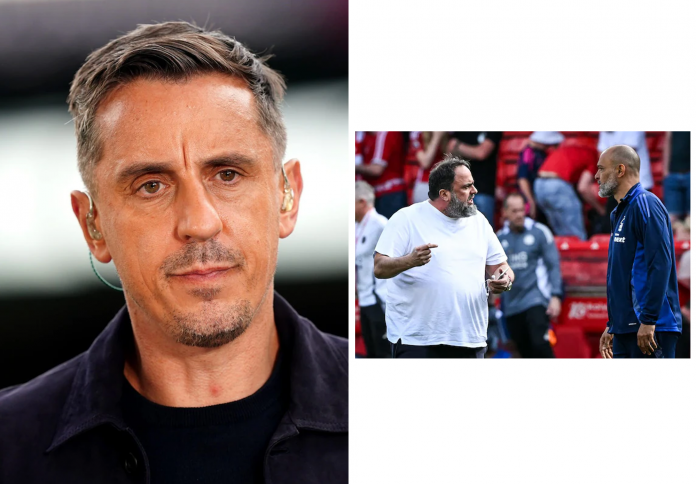In a rare and highly publicized move, Nottingham Forest has refused to grant Gary Neville accreditation to cover their final Premier League game of the season against Chelsea. The decision has prompted Sky Sports to host the match remotely, marking an unprecedented rift between the club and one of football’s most respected pundits. The fallout traces back to a bitter feud with Forest owner Evangelos Marinakis, whose contentious actions and clashes with Neville have cast a shadow over what should be a celebratory fixture.
Escalating tensions between pundit and club
Gary Neville’s ban from Nottingham Forest’s final home game against Chelsea represents a dramatic escalation in a feud that has simmered for months. The former England and Manchester United defender, who has become one of football’s most respected voices on Sky Sports, was denied accreditation for the match at the City Ground. This decision shocked Sky Sports and football fans alike, as it is exceedingly rare for a club to exclude a high-profile pundit from matchday coverage, especially for such a pivotal fixture.

Sky Sports responded swiftly, opting to broadcast the game remotely from their studios in West London, an unusual step for one of the Premier League’s marquee games. Neville himself chose to withdraw from coverage entirely, stating that without access to the ground, his role was untenable. “I’ve dished out my fair share of criticism and praise in the last 14 years of doing this job and have never come close to this unprecedented action,” Neville wrote on Instagram.
The roots of the conflict lie in the past year’s controversies surrounding Forest and their Greek owner Evangelos Marinakis. Tensions worsened following a post-match incident after a 2-2 draw with Leicester City, when Marinakis stormed onto the pitch during an injury to striker Taiwo Awoniyi. Neville publicly condemned the owner’s behaviour on social media, calling it “scandalous” and suggesting the manager should consider his position. This public criticism, along with previous sharp remarks, has led Forest to view Neville as hostile and potentially antagonistic to their interests.
The fallout from public criticism
The clash between Gary Neville and Nottingham Forest has not been confined to social media disputes. Following the incident involving Taiwo Awoniyi, who was rushed to hospital and placed in an induced coma due to a serious abdominal injury, Forest issued a lengthy and strongly worded statement condemning what they described as “baseless and ill-informed outrage for the purposes of personal social-media traction.” The club emphasized their focus on the player’s recovery while criticizing Neville’s comments as unfair and harmful.
Forest’s stance is that Neville’s commentary, particularly his public condemnation of Marinakis, has alienated the club and their supporters. The owner’s presence on the pitch during a tense moment was seen by many as inappropriate, yet the club perceives Neville’s reaction as a personal vendetta, further deepening the rift. This is compounded by Neville’s previous controversial remarks likening Forest to a “Mafia gang” after a defeat last season, comments that were never retracted and only added fuel to the fire.
The tension also extends beyond football, as Marinakis is involved in ongoing legal battles. The club’s owner has lodged a £2.1 million libel lawsuit involving parties linked to rival Greek football clubs and political figures. Documents submitted to the High Court claim Neville was targeted by a smear campaign orchestrated by Marinakis’ rivals, which supposedly influenced the pundit’s hostile stance. While these legal details are complex, they illustrate how off-pitch matters may be influencing the acrimonious relationship.
Sky sports and the unprecedented ban
For Sky Sports, the decision by Nottingham Forest not to accredit Gary Neville has set a concerning precedent. As the Premier League’s largest broadcasting partner, Sky relies on respected analysts like Neville to bring insight and credibility to their coverage. Denying such access not only limits the broadcaster’s journalistic freedom but also impacts the quality of live commentary for fans.
A Sky Sports spokesperson described Forest’s move as “unprecedented and unwelcome,” highlighting the rarity of such bans in top-flight football. The network was forced to rapidly adapt by producing the broadcast from their studio instead of on-site. Although a commentary team remains at the City Ground, Neville’s absence is palpable given his high profile and expertise.
Neville, widely regarded for his fair and insightful analysis, expressed disappointment but also respect for the club’s right to control stadium access. “It’s symptomatic of things that have happened over the last 12 months with the club,” he said, while still wishing Forest success in their quest for Champions League football next season.
A fractured future for forest’s media relations
The ban on Gary Neville reflects deeper fractures within Nottingham Forest’s current climate, both on and off the pitch. The club’s owner, Evangelos Marinakis, has become a divisive figure, with supporters split between loyalty and frustration. The episode also raises questions about the relationship between football clubs and the media, especially in an era where social media commentary can have far-reaching consequences.
Premier League clubs retain the authority to decide who is granted media access at their grounds, but Forest’s move may lead to scrutiny over the limits of such power. It also presents a challenge for broadcasters, who must balance access with maintaining journalistic integrity and supporting their presenters.
For Gary Neville, this may be a temporary setback, but it marks an uncomfortable chapter in a decorated media career. The feud underscores the increasingly complex interactions between football owners, pundits, and broadcasters in a sport that thrives on transparency but is often vulnerable to behind-the-scenes power struggles.
In conclusion, Nottingham Forest’s decision to ban Gary Neville from the City Ground broadcast represents a rare and notable clash in football media relations. With Sky Sports forced to adapt and Neville stepping back, the incident shines a spotlight on the tensions between club ownership and media freedom. As Forest look ahead to their final game of the season, the wider fallout of this dispute will undoubtedly continue to reverberate across the Premier League landscape.










